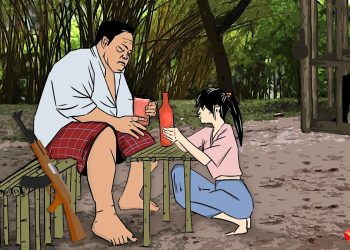The military takeover last year fractured Myanmar’s media into three distinct groups. Needless to say, one group supports the regime while another – the country’s once mainstream but now exiled independent media that is still reporting on the country – principally opposes military rule.
The third group is media with military backgrounds.
Which group does the media outlet that you regularly read belong to?
Readers might feel uncomfortable browsing this article, but sometimes it’s necessary to wash our dirty linen.
Exiled again but still independent and professional
One of the first things military dictators do after seizing power from a democratically elected government is clamp down on independent media.
Dictators hate listening to voices criticizing their coup and the consequences of a military takeover.
Barely a month after seizing power, Myanmar’s military regime had revoked the licenses of Myanmar Now, 7 Day, Mizzima, DVB and Khit Thit.
Local media outlets Myitkyina News Journal (Kachin State), Delta News Agency (Ayeyarwady Region), Tachilek News Agency (Shan State), Zayar Times News Agency (Sagaing Region), Kantarawaddy Nes Agency (Kayah State) and Independent Mon News Agency were also banned.
Meanwhile, the offices of media including The Irrawaddy, Mizzima and Myanmar Now were raided by regime troops following their close coverage of the junta’s bloody crackdowns on peaceful anti-coup protests. The Irrawaddy office in downtown Yangon was raided twice, in a campaign of junta intimidation that is described in more detail below.
Worse still, the junta has arrested media workers for doing their jobs, turning Myanmar into the world’s second-worst jailer of journalists after China with at least 26 behind bars, according to Committee to Protect Journalists’ 2021 prison census.
The bans, raids and arrests sent a clear message to the press that there is no space for independent media under military-ruled Myanmar. Journalists went into hiding. To keep reporting on the regime’s atrocities and the junta’s impact on the day-to-day lives of Myanmar people, The Irrawaddy, Mizzima, DVB, Myanmar Now and others were forced to relocate to other countries.
For The Irrawaddy, Mizzima and DVB, this marked a return to exile for the first time since 2012. But as established independent media, they have maintained their professional journalistic standards while wrestling with financial, legal and security issues in their host countries.
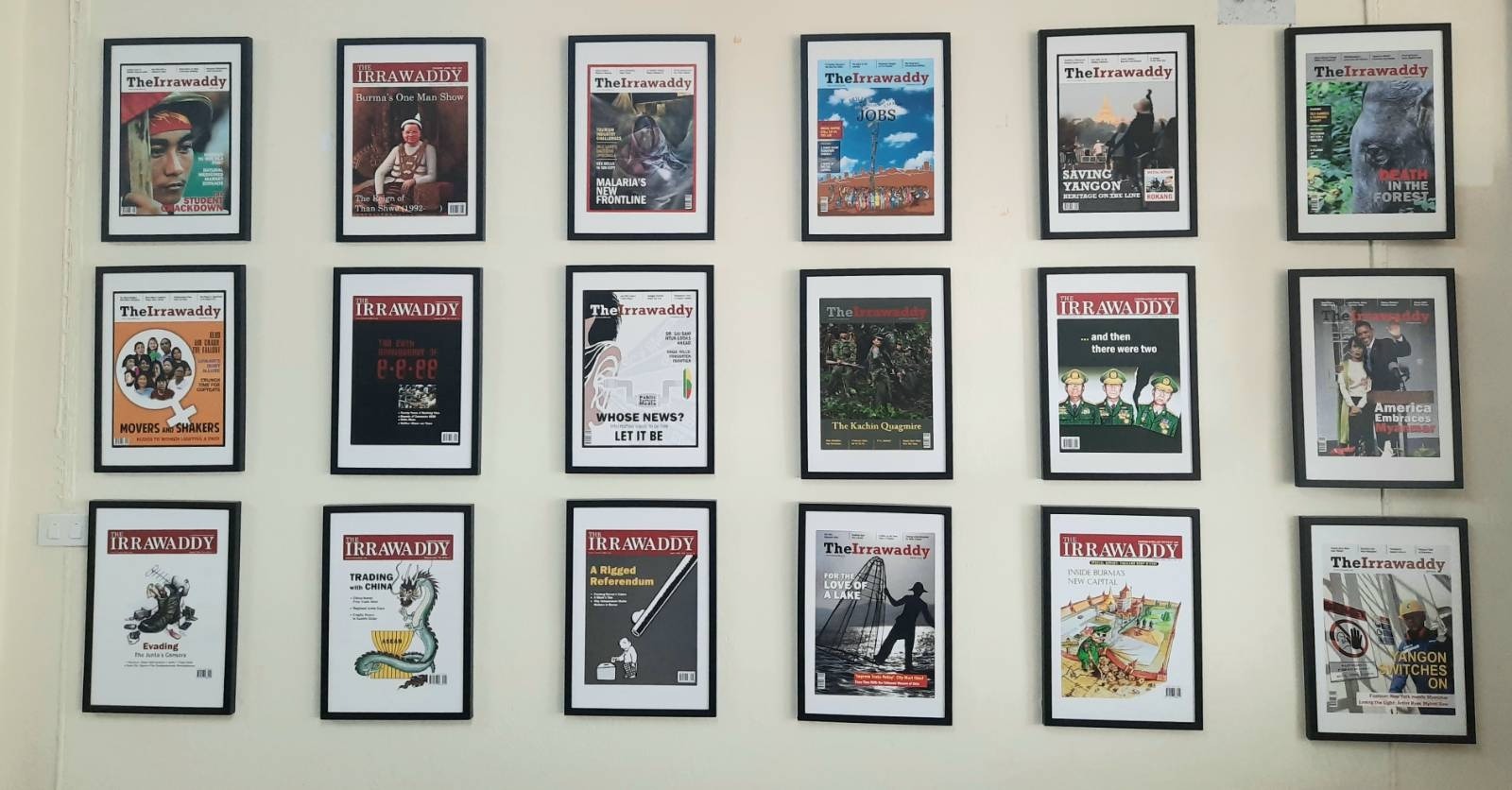
On the other hand, the Burmese services of Voice of America (VOA), BBC and Radio Free Asia can still operate in military-ruled Myanmar.
Some, however, have upset their audience with controversial reports criticized for leaning towards the junta following the coup last year.
For example, a VOA Burmese report on November 7 last year claimed that thousands of people attended a junta-promoted hot air balloon festival in Mandalay’s Pyin Oo Lwin, the seat of Myanmar’s military academies. It drew condemnation from readers as there was no evidence of thousands of festivalgoers in the photos featured along with the report. The audience’s anger focused not just on the story’s accuracy but also the fact that a US government-funded broadcasting service was promoting the junta’s desperate claim that Myanmar under military rule was back to normalcy.
In another story in May, VOA Burmese reported that “at least 180 Myanmar journalists were sheltering in Thailand.” Though the figure was not disputable, the report amounted to leaking information to a regime that has detained and jailed journalists since the coup, said netizens.
Democracy activists also questioned VOA’s reporting.
“We no longer take questions from VOA as we don’t like their stance,” said a leading member of an established Myanmar rights group.
VOA is one of the few media outlets favored by junta spokesman Major-General Zaw Min Tun, who never fails to respond to its questions and offer information, while never answering phone calls from media operating outside the country.
As a consequence, its audience often find that VOA reports amount to regime propaganda despite its claim of “impartiality.” The head of VOA Burmese is currently under investigation for sexual harassment.
BBC Burmese Service is another outlet apparently favored by the regime.
In October this year, the regime vowed to file charges against The Irrawaddy and BBC over their coverage of a deadly shooting at Mon State’s Golden Rock Pagoda. But no action was taken against the BBC, and Maj-Gen Zaw Min Tun continues to give interviews to the outlet as if nothing had happened while BBC reporters are still working in the country.
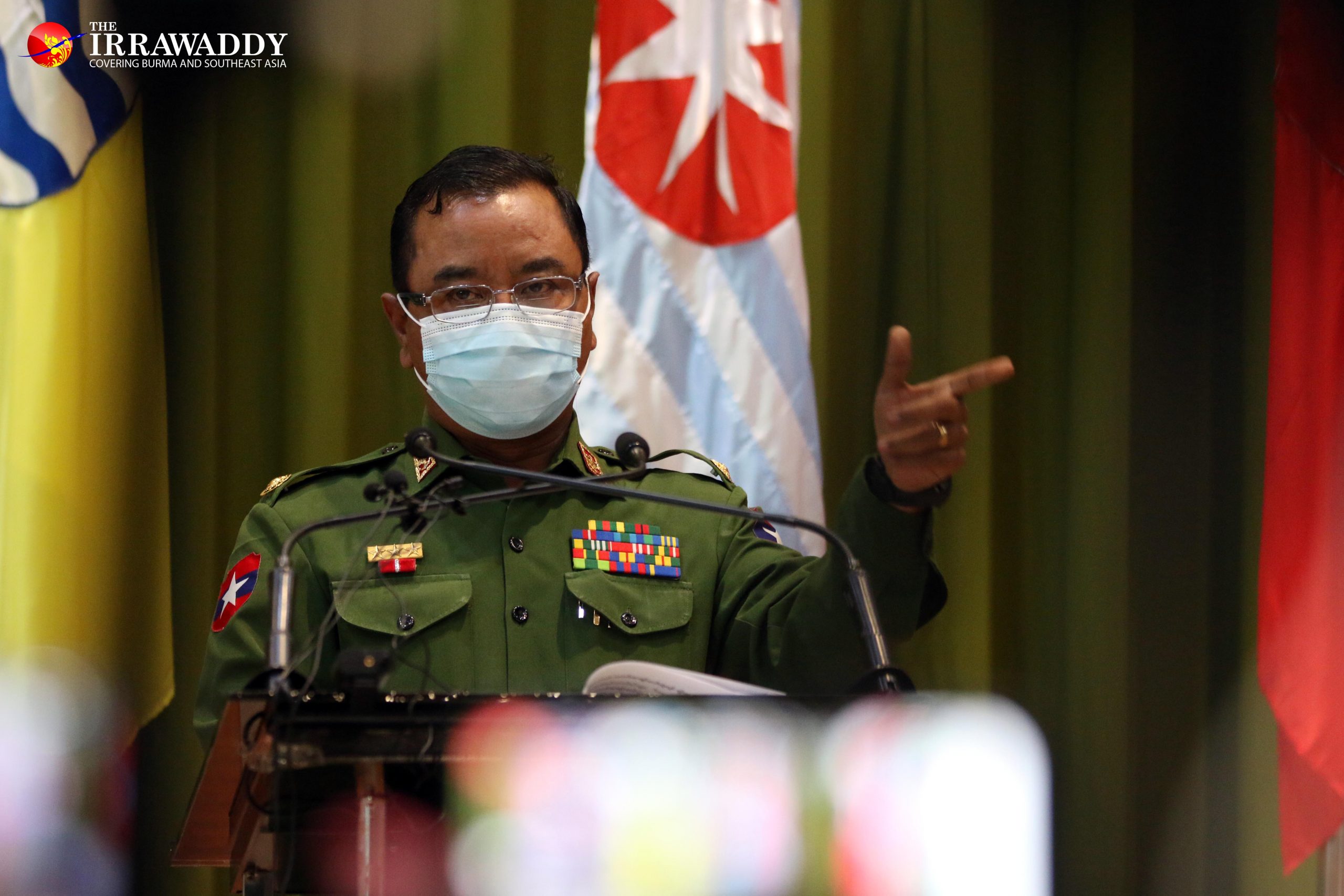
In contrast, the regime officially banned The Irrawaddy in the same month by revoking its publishing license after the news agency failed to parrot its official account of the Golden Rock shooting. The ban came after lawsuits, raids, arrests and other moves targeting the independent news agency since the coup last year. Regime personnel arrested The Irrawaddy’s publisher, a former photojournalist and a staff member while also raiding the home of one of its editors.
Pro-junta media
Regime-sponsored media have mushroomed since the coup. Their reporters are regulars at press conferences given by the military regime. They can also be found in private groups of the junta information team.
Realizing the media’s power and influence, the military approached several outlets even before the coup with offers of incentives and business opportunities in exchange for favorable coverage.
There are now more than two-dozen pro-junta media outlets run by former military officials, members of regime-friendly political parties and ultra-nationalists. They are mostly active on social media like Facebook and post their propaganda talk shows on YouTube and Telegram.
The junta has state-owned newspapers, radio and TV stations for propaganda purposes but people rarely pick up its papers or tune into its services. So the regime is funding other media to tap Myanmar’s growing audience on digital platforms.
The purpose the funding of these so-called media is to drum up support for the junta, to undermine the anti-regime movement by spreading disinformation, and to discredit independent media coverage of the anti-regime movement – an old trick of the previous junta to “use media to attack the media.”
The most infamous pro-junta outlet is Thuriya Nay Wun, owned by Moe Hein. Despite being a member of the 88-Generation at the forefront of the 1988 pro-democracy uprising, Moe Hein took sides with the dictatorship for personal interests. In return, he was handed property in Naypyitaw, a monthly allowance, and regular funding for his media house.
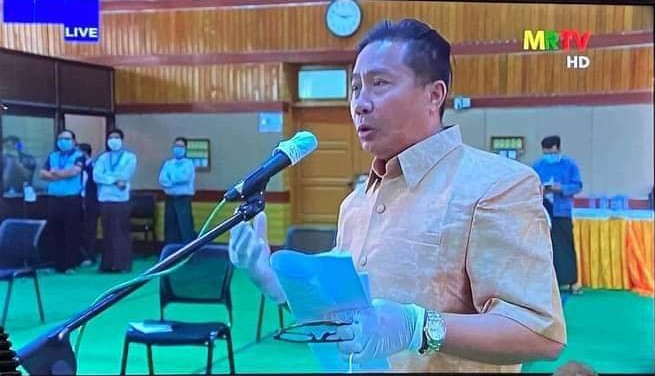
At junta press conferences, he calls for the crushing of the shadow government National Unity Government, its People’s Defense Force armed wing, and parliamentary Committee Representing Pyidaungsu Hluttaw, the group of lawmakers elected in the 2020 general election.
He also spreads propaganda in his regular shows broadcast on junta mouthpiece Myawaddy TV and junta-controlled state broadcaster MRTV.
Another pro-junta media is Myanmar Hard Talk, whose chief editor Aung Min is a staunch supporter of the military and even more dogmatic than Moe Hein.
Neo Politics News Agency headed by Kyaw Myo Min, former editor-in-chief of Akone Thi media, is regime-friendly too.
The junta can also count on People Media and its chief editor Kyaw Soe Oo.
All four of these outlets have displayed support for the military regime in video clips posted on their Facebook pages.
The pro-junta Myanmar National Post is helmed by chief editor Naung Taw Lay and backed by ultranationalist group Ma Ba Tha.
NHP is led by Win Oo, who was jailed under the ousted National League for Democracy (NLD) government for vandalizing a new Yangon bus stop.
When US President Joe Biden called for democracy to be restored in Myanmar, Win Oo’s NHP twisted Biden’s words to claim the US was merely urging the regime to hold an election as soon as possible.
Another infamous pro-regime outlet is Bullet Journal, led by U Hla Swe. The former lawmaker from the military’s proxy Union Solidarity and Development Party and ex- lieutenant-colonel is notorious for badmouthing the ousted NLD and the anti-regime movement. He has openly admitted to helping secure arms for pro-junta militias that have joined regime troops in upper Myanmar to raid villages and loot civilian property.
Media with a military background
Myanmar media is no stranger to military affiliations and financing. Some of these outlets still survive today.
Military involvement in today’s media dates back to 2000 and the previous junta, when then military spy chief Lt-General Khin Nyunt and his Office of Strategic Studies (OSS) masterminded the launch of the Myanmar Times. Khin Nyunt is responsible for the jailing, torturing and killing of political activists following the 1988 democracy uprising.
A pet project of the previous junta, the Myanmar Times served as the military leadership’s mouthpiece, promoting Khin Nyunt’s faction and also Myanmar as a business-friendly country that was not as bad as painted in exiled media outlets. The SASAKAWA foundation provided assistance to the Times and controversial Australian editor Ross Dunkley, who was later charged with drugs and prostitution, was hired to pump the propaganda. Certain western diplomats also backed the Times in the vain belief it could help push political change.
An influential OSS officer named Col. Thein Swe, the righthand man of Khin Nyunt, appeared to be actively involved in running the paper. When the Times was launched, Thein Swe told Asiaweek that it would be “different, more flexible” than other papers. Thein Swe’s son, Sonny Swe, who now runs Frontier Myanmar, held a 51-percent stake in the newspaper. While all other media outlets faced draconian censorship, Myanmar Times reports just went through the Directorate of Defense Services Intelligence (DDSI) and were approved overnight.
Col Thein Swe was later promoted to brigadier-general and headed the regime’s Military Intelligence international relations department. He was a military attaché to the Myanmar embassy in Bangkok in the 1990s, when he reportedly hired thugs and informants and pushed Thai authorities to crack down on Myanmar democracy activists and journalists sheltering in the kingdom.
Bertil Linter, who is based in Thailand and has covered Myanmar since the late 1980s, said he was once on Thein Swe’s hit list for his reporting on the then junta.
“I confronted him over it when we met at a diplomatic function in Bangkok, and he fled the scene,” the veteran Swedish journalist recalled.
After Khin Nyunt was purged in 2004 during Than Shwe’s crackdown on military intelligence to maintain power, Thein Swe and his son were thrown into prison. The then regime charged Sonny Swe for breaking censorship regulations. The Myanmar Times halted operations following the coup in February last year.
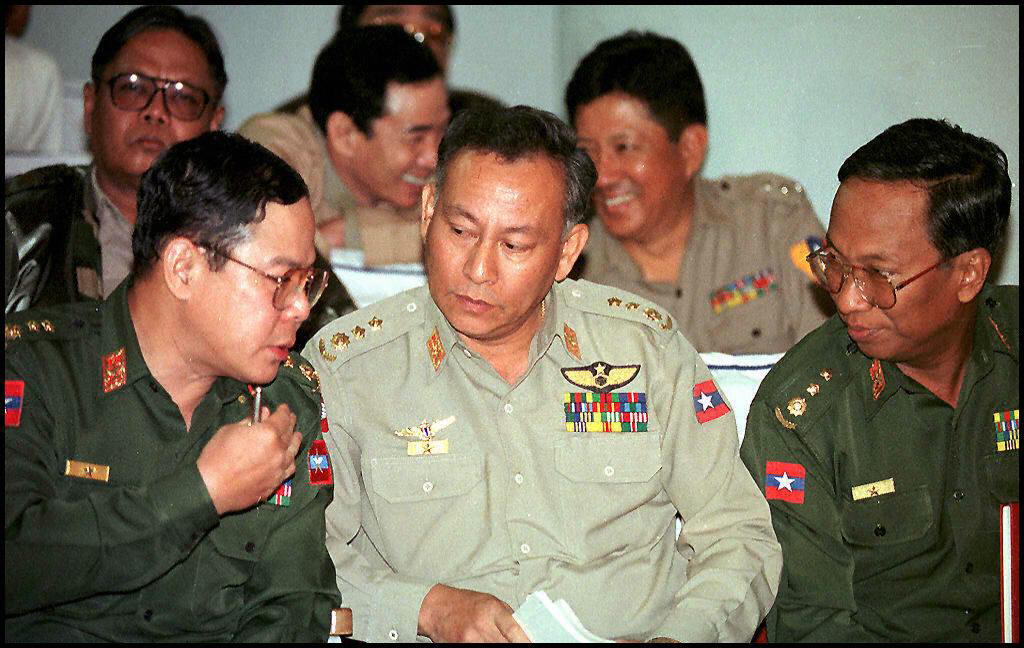
Another longstanding media outlet still running inside Myanmar is Popular News, which focuses on junta-related news and ignores the resistance movement.
Popular News is owned by Daw Nan Kalyar Win, daughter of former military dictator Than Shwe’s confidant General Win Myint. Thanks to her family background, she landed an interview with Min Aung Hlaing just before the 2020 general election. The military chief hinted he was doubtful of the integrity of the poll while alleging shortcomings in election preparations.
Another outlet still tolerated by the junta is Eleven, which makes sure it avoids upsetting the regime in reports. The Standard Time runs on a similar policy.
How long before Myanmar outlets can return?
The Irrawaddy and other media agencies that went into exile after the 1988 pro-democracy uprising returned to Myanmar under U Thein Sein’s government in 2012.
Media played an important role in national reconciliation after democracy icon Daw Aung San Suu Kyi entered Parliament in 2012.
However, with advertising revenues switching to social media, media agencies were already struggling when they were hit by the COVID-19 pandemic.
After the coup last year, independent newsrooms that promote pillars of democracy like human rights and freedom of expression were unable to operate inside the country.
After the 1988 military takeover, it took two decades before exiled media could return to Myanmar.
No one knows how long media agencies will have to wait this time after being forced out by the 2021 coup. To answer that question, we would need to know when the military dictatorship will end in Myanmar. One thing is sure, however: the media will return home when there is a democratically elected government in power in Myanmar.
Hpone Myat and David Aung are local senior journalists in Myanmar.

















